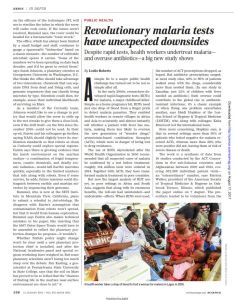Join getAbstract to access the summary!

Join getAbstract to access the summary!
Leslie Roberts
Revolutionary Malaria Tests Have Unexpected Downsides
Despite rapid tests, health workers undertreat malaria – and overuse antibiotics – a big new study shows
Science, 2017
What's inside?
Health workers can detect and treat malaria. Why then does it persist as a public health issue?
Recommendation
With the availability of a simple test to detect malaria and a therapy to treat it effectively, the disease should no longer be a major public health issue. In fact, rapid diagnostic tests (RDTs) and artemisinin-based combination therapies (ACTs) have revolutionized malaria treatment in poor areas of Africa and South Asia. However, a meta-study reveals undesirable effects that accompany the benefits. Leslie Roberts, a deputy news editor at Science Magazine, discusses the underlying issues, points out the needs, and cites medical experts. getAbstract recommends this article to anyone interested in public health issues.
Summary
About the Author
Leslie Roberts is a deputy news editor at Science Magazine where she supervises the biology writing team. Her recent articles focus on infectious diseases in poor countries.
















Comment on this summary